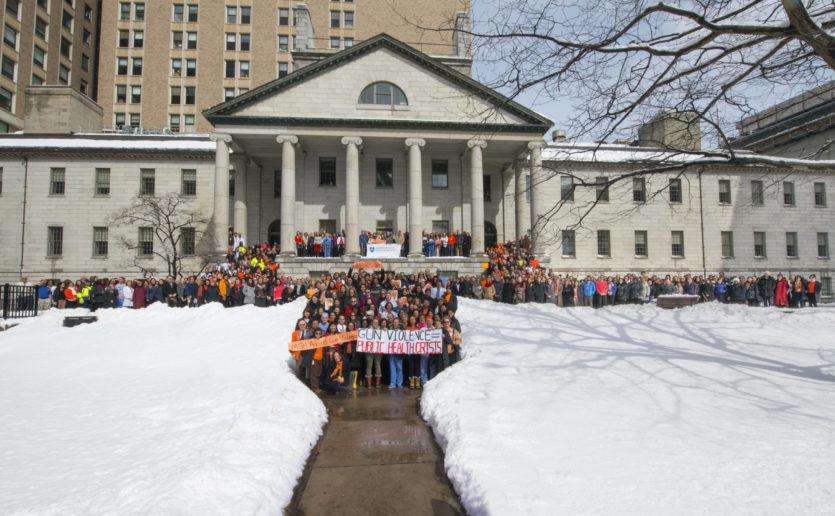The tragic massacre at Marjory Stoneman Douglas High School in Florida recently not only stole the lives of 17 students and teachers and injured 15 others, it also ripped open invisible wounds and confirmed yet again that gun violence represents a major public health issue.
The issue has been on the minds of many at Mass General who continue to look for ways to address this problem through advocacy, education and prevention.
While the latest horrific shots rang out 1,400 miles from Boston, the ricochets were felt here and across the nation. Our response has become almost routine: shock and horror, followed by anger, finger-pointing, the promise of change and, sadly, inaction. Then, as we struggle to heal, another shooting occurs and the cycle repeats itself. So far in 2018, our nation has seen 18 instances of school shootings. Do we need another massacre – another life lost, another family broken, another community shattered – before we take decisive action?
Clearly a Health Epidemic
Gun violence clearly has become a health epidemic. As an organization committed to heal, to prevent injuries, to promote good health, Massachusetts General Hospital bears a responsibility to be part of the national dialogue on this epidemic. Academic medical centers like Mass General look to science and research to address health problems, so it is particularly disturbing that in 1996 Congress passed a bill that included an amendment prohibiting the Centers for Disease Control and Prevention from using funds to study or promote gun safety. Recent attempts to repeal this provision have failed, essentially blocking important research that could improve the safety of firearm use and possibly save lives.

Also concerning is that a handful of states in recent years have considered legislation to prevent health care providers from discussing guns and gun safety with patients.
Many states, however, including Massachusetts, have taken the opposite approach, encouraging healthcare providers to ask patients about the presence of guns in the home and talk about gun safety.
Action and Patient Health
The issue has been on the minds of many at Mass General who continue to look for ways to address this problem through advocacy, education and prevention. The Mass General Physicians Organization (MGPO) last year conducted a survey of physicians about gun control, and the results demonstrated a strong desire for Mass General staff to take a stand. The position statement that the MGPO put together read, in part:
We, the physicians of Massachusetts General Hospital, ask for the same level of support for research, teaching, social services, and thoughtful policy to prevent gun violence and treat its victims that any other disease of such magnitude would command. The health of our patients, and the people of our country, depend on these actions.
Several Mass General staff members have used their experiences and their words to describe the agony and despair associated with gun violence.
Several Mass General staff members have used their experiences and their words to describe the agony and despair associated with gun violence. Peter Masiakos, MD, pediatric trauma surgeon, and Cornelia Griggs, MD, chief resident in General Surgery, wrote a New England Journal of Medicine piece called The Quiet Room about heart-wrenching conversations with parents whose children have been killed by bullets.
Also in the NEJM, Chana Sacks, MD, a hospitalist in Mass General Internal Medicine, whose young cousin was killed in the Sandy Hook Elementary School shooting, penned In Memory of Daniel – Reviving Research to Prevent Gun Violence, an emotional and exquisite plea for action. Dr. Sacks and Dr. Masiakos – along with Kim Sheppard, RN, Translational and Clinical Research Unit, and Paul Currier, MD, Anesthesia, Critical Care and Pain Medicine – established an organization at Mass General called Gun Violence Prevention to advocate for gun safety and stop gun violence.
Overdue Vital Steps
In addition to these efforts, the Consortium for Affordable Medical Technologies (CAMTech), a program within the Mass General Global Health, this April will host a summit and hack-a-thon focused on public health approaches to firearm safety and violence prevention in which multidisciplinary teams will identify, develop and pitch ideas and solutions.
I ask that we all take a moment to remember the lives lost in Parkland and their grieving families, friends and community. I admire the resolve of those student survivors who have grasped the issue of gun violence and have channeled their anger and grief into positive actions that are spreading among students throughout the nation. These voices are loud and strong, and they are being heard.
We can honor those who have been senselessly gunned down by taking a variety of bold and long-overdue steps – passing laws, funding research, having conversations – vital steps that may prevent the next tragic mass shooting.

